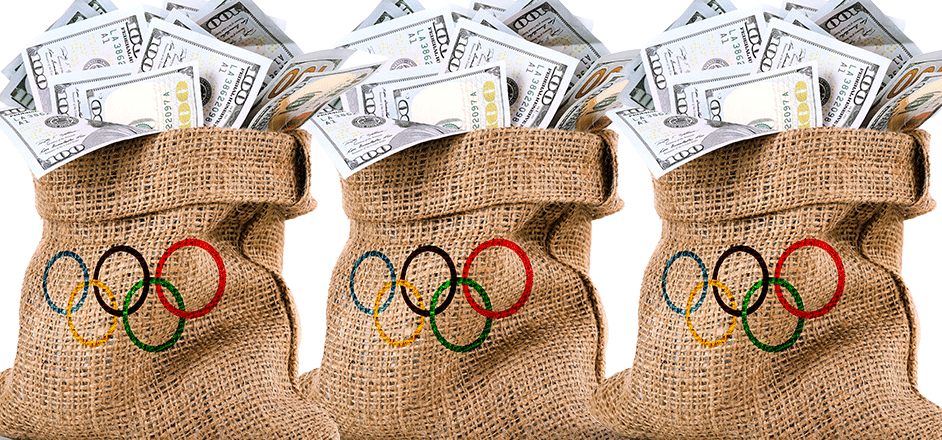A wise coach once said that sports are a “microcosm of society.” There are frustrations, happy times, bad times, highs and lows, drama, relationships, personal struggles, and, of course, rampant criminal corruption at the highest levels of management and leadership.
It’s true. Especially that last bit. And if you don’t believe me, one only has to look to the two most corrupt organizations in sports in the world (which also happen to be two of the largest): The Fédéracion Internationale de Football Association (FIFA) and the International Olympic Committee (IOC).
These two international non-governmental, non-profit organizations make an awful lot of dirty money for the people running them. And it goes deeper than that. Because, if you put stock in anything the whistleblowers say, individuals within these organizations are sometimes accepting bribes to rig the games.
Yes, Big Sports is a dirty, dirty business. It always has been and always will be. Just like life. See: it’s a microcosm.
With FIFA having just happened in Qatar, and the Summer Olympic Games happening in Paris next year, I figured it was high time to pry these grifting “non-profits” open like a chest cavity and bury our faces in their dirty, twisted, venal guts.
The Father of FIFA
It starts with a farmer of sorts, a Brazilian man named João Havelange. He’s considered the “father” of the 111-year-old organization and without a doubt, Ol’ João expanded the reach of soccer internationally by promoting FIFA as widely as he did through the ‘80s and ‘90s.
But João also was the man who planted the seeds of corruption in FIFA that would take root and flourish, growing to enormous, internationally corrupt proportions. During his tenure running the “non-profit” organization, João and his son-in-law Ricardo took more than $22 million in bribes for FIFA marketing and advertising deals.
2015 Indictments
Back in 2010 FIFA chose Qatar for its 2022 host nation—which raised a lot of red flags for people paying attention at the time. Why on Earth would an international organization like FIFA choose a country with such a small population, and so roiled in controversy over its treatment of migrant workers (read: slaves)?
The answer is simple: dolla’ bills baby. Qatar is one of the richest (and most corrupt) nations in the world thanks to the ocean of oil it sits on. It seemed clear they bought the bid from the board who decides on annual venues (the same way Russia bought its bid for the 2018 games).
That was just rumors until 2015, when 50 individuals and corporate defendants in and around FIFA were indicted by the US Department of Justice for racketeering, wire fraud and money laundering. Twenty-seven people and four corporations pleaded guilty and the DOJ seized $201 million from former officials—which they then gave back to FIFA. Yes, really. Because, after all, the hapless non-profit was totally just a victim.
Russia similarly bribed its way into getting the 2018 bid—as did Brazil, South Africa and Germany before that. Allegedly, we must add, for legal reasons.
At a certain point, the question becomes how much can you buy? How deep can you bribe? If you can pay to be host, can you pay to be a winner as well?
The answer is yes. Which is an almost perfect segue into the IOC.
Corruption on Mount Olympics
Everyone loves to hate on FIFA’s corruption, but they love the Olympics too much to question it. But I’ve got news for you: as a non-governmental, international non-profit organization the IOC suffers from the same, exact corruption problems.
Just look at the 2020 Tokyo Olympics when a Japanese official was caught taking bribes for marketing, sponsorship and advertisement deals (sound familiar?). Or how about the Korean whistleblower Ho Kim, who exposed how bribery decided who won Olympic and World Championship boxing matches. In Athens, securing the gold medal cost a meager $1 million. In London it cost $10 million, according to Kim. Which, throws the whole spirit of the Olympics out the window.
But, it might have already been out there. Doping in the Olympics is well-documented and widely understood to be a serious issue. But the public doesn’t know the half of it. Because, on a certain level, the Olympic Games are more than a physical contest. They’re a chemical and pharmaceutical competition as well.
The Drug Olympics
The Russians are well known for their athletic doping efforts. In November of 2015 they were busted by the World Anti-Doping Agency for saucing their athletes to the gills. They had a super-sneaky method that involved “shadow laboratories,” destroyed urine samples and surveillance lab workers. Which just means they’re the worst at doping. If you think they’re the only ones doing it, I’m sorry to burst your bubble: they’re not. They’re just the most careless and least creative. Many other countries (yes, including ours) is juicing their athletes via methods that are insofar untraceable. Kind of like serial killers: the ones we know about are the shitty ones who can’t get away with it. The Gold Medal dopers are the one’s we’ll never know about.



Leave a Reply